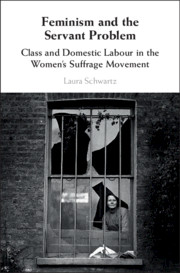Book contents
- Feminism and the Servant Problem
- Feminism and the Servant Problem
- Copyright page
- Contents
- Figures
- Acknowledgements
- Introduction
- 1 The ‘Servant Problem’ and the Suffrage Home
- 2 Servants in the Suffrage Movement
- 3 The Housework Problem
- 4 Domestic Labour and the Feminist Work Ethic
- 5 The Domestic Workers’ Union of Great Britain and Ireland
- 6 Servants and Co-operative Housekeeping
- Conclusion
- Select Bibliography
- Index
4 - Domestic Labour and the Feminist Work Ethic
Published online by Cambridge University Press: 19 July 2019
- Feminism and the Servant Problem
- Feminism and the Servant Problem
- Copyright page
- Contents
- Figures
- Acknowledgements
- Introduction
- 1 The ‘Servant Problem’ and the Suffrage Home
- 2 Servants in the Suffrage Movement
- 3 The Housework Problem
- 4 Domestic Labour and the Feminist Work Ethic
- 5 The Domestic Workers’ Union of Great Britain and Ireland
- 6 Servants and Co-operative Housekeeping
- Conclusion
- Select Bibliography
- Index
Summary
The right to professional employment, and the training and education that this necessitated, had been central demands of British feminism since the 1860s. Financial independence and the fulfilment of creative potential were counterposed to the enforced idleness and dependencies of the middle-class home. The association of emancipation with the public world of work retained a powerful hold over the feminist imagination into the twentieth century, and the suffrage movement often pointed to women’s labour as the basis for their claim to citizenship. This rhetoric of work was seen to unite the interests of middle-class professional women and their working-class sisters. There was much uncertainty, however, over whether domestic labour ought to be included in this vision of ennobling and liberating work. The desire to free women from the burden of housework was not simply about protecting them from overwork, or allowing them to do other work, but often was articulated as the right to do better work. This chapter examines two debates in the suffrage movement that posed this question particularly sharply: first, those surrounding the proposal for the endowment of motherhood; second, the controversy over the course in Home Science and Economics at Kings College for Women.
Keywords
- Type
- Chapter
- Information
- Feminism and the Servant ProblemClass and Domestic Labour in the Women's Suffrage Movement, pp. 120 - 146Publisher: Cambridge University PressPrint publication year: 2019



